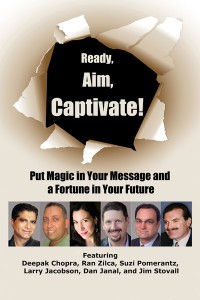In 2005, Gallup surveyed 13- to 17-year-olds and asked them what they are most afraid of? “Fear of failure or of not succeeding in life” was listed as number four, after terrorism, spiders and death. “Making mistakes that will mess up my life”; “not being successful”; “not measuring up”; “not getting into a good college”; “I’ll close doors on myself and find myself in a position where I can’t succeed because of something I’m doing right now”; “fear of failing in life in general — not achieving the goals I have set for myself” and “not leaving a mark” were the biggest concerns expressed by the teens that participated.
In 1996 when I was 32 years old, I decided to email President Bill Clinton at the White House about the four core subjects that I believed should be taught in every high school that would help address the majority of these teenagers’ fears. Shortly thereafter, I received a response letter back from the President thanking me for my suggestions. Unfortunately, nothing became of it. Then in 2008, when the economy almost went into another financial depression, I began to realize the underlying reason why so many adults between the ages of 40 and 60 are in such economic chaos, and I began following my passion for speaking and educating young and “Emerging Adults,” ages 16-25, in the areas of personal and financial success.
Dr. Jeffrey Arnett, Research Professor at Clark University (Worchester, Massachusetts), describes this demographic (Emerging Adults) as the period between 18 and 25 years of age where adolescents become more independent and explore various life possibilities. Arnett said in 2006 that given some emerging adults’ struggles, he sees the need for greatly expanded societal efforts to help them navigate the transition into careers and family. He believes such efforts would pay off, given the self-awareness people develop in their 20s and their willingness to change. “If you provide them with resources, they’re much more likely to say, “How can I improve my life?” At that time, he hoped that his book, Emerging Adults in America: Coming of Age in the 21st Century, would build a community of scholars devoted to studying the “emerging adult” period of development.
As Founding President of the Society for the Study of Emerging Adulthood (SSEA.org), Arnett is focused on finding theories and encouraging research related to emerging adults (ages 18 – 29 years). The primary goal of the Society is to advance the understanding of development in emerging adulthood through scholarship, education, training, policy and practice.
In July 2012, USA Today reported that Clark University commissioned a national survey for adults ages 18-29 (dubbed emerging adults) as part of an ongoing study, and the top two answers to the question asked in the survey about what respondents felt was the MOST important factor for becoming an adult were accepting responsibility for yourself and becoming financially independent. The cost of financial illiteracy was the topic of another USA TODAY article in April 2012, which stated that studies show that a majority of young people in the United States have poor financial literacy, a trend that has been consistent over the past decade and shows few signs of improving. In this article, Annamaria Lusardi, an economics and accountancy professor and director of the financial literacy center at George Washington University, said, “If we live in a world where people are in charge of their own financial well-being … we have to equip people to deal with this individual responsibility.”
Steven Bahls, President of Augustana College believes that colleges and universities should do a better job in providing “more education about financial literacy and the practical aspects of living in today’s world.” In his 2011 Inside Higher Ed article, “Time to Teach Financial Literacy,” he revealed insights he gained from conversations with graduates who confided their frustrating lack of ‘real-world’ financial knowledge. “Our graduates can’t create wealth and jobs if they don’t have the ability to balance a checkbook, or the skills to hold a job.”
In my new book, Demystifying Success: Success Tools and Secrets They Don’t Teach You in High School, I inspire and motivate Emerging Adults to help them not only pursue their life-long goals on their own terms, but also to define a practical approach to understanding the purpose behind what will manifest their future success. The book is intended to educate young and Emerging Adults, as well as adults of all ages, about the secrets of concrete personal goals/plans, which will allow them to become one of the fortune 10% of the population who understand solid financial habits.
This past January, I appeared as a contributing co-author alongside Deepak Chopra and Suzi Pomerantz in the #1 international best-selling book, Ready, Aim, Captivate: Put Magic In Your Message and a Fortune in Your Future. In my chapter interview, I discuss the personal and professional challenges that I had to overcome as I rose to the top of my professional field. I also shared how I created my speaking platform for the next generation of young and Emerging Adults including tools and resources to help them manage their fears while also taking the necessary action steps needed to successfully accomplish their goals.
As a member of SSEA, I am looking forward to joining Jeffrey, Steven and the rest of the Society in educating emerging adults to become more successful by providing them with the resources and tools (such as my T.I.M.E. model) to grow their success.

